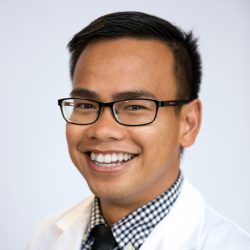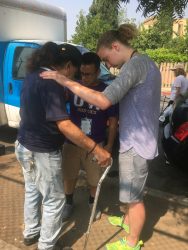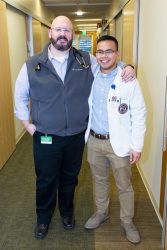Hiep Nguyen is right out of one year in the classroom at MEDEX Northwest and into his 4-month family medicine preceptorship at Kaiser Permanente Puyallup Medical Center.
“We’re actually seeing the things that we learned behind a desk during the didactic year,” he explains. “It’s all a little different from what we learn on PowerPoint slides and in lectures, so we get to integrate it a lot better when we actually see it here in the clinic.”
Under the guidance of his clinical preceptors, this is something that Hiep is working on carefully.
“I’m working to make sure I learn things well so I can use it for the benefit of my future patients.”
With a previous background in clinical research at the University of Washington and Seattle Cancer Care Alliance, Hiep had to jump right into clinical care with no cushion.
“It’s learning how to swim by jumping in.” He’s quick to add that the experience at Kaiser Permanente Puyallup has been great. “I’ve seen so many different types of patients, types of cases, and medical conditions. The medical staff here has been very supportive, especially for students like myself so early in our training. I’ve been having a lot of fun.”
That said, there are definite challenges with not knowing as much as he’d like. But Hiep is working on what he needs to know right now and discovers everybody’s really supportive of that.
At KP Puyallup, Nathan Dewitt, PA-C is his preceptor of record.
“He’s the main person that tells me what I need to learn,” Hiep says. During his initial weeks at the Kaiser Permanente site, Nathan worked closely with Hiep to assess his skills level. Eventually, Hiep was moved around the Puyallup clinic with different providers to experience a fuller range of family medicine— pediatrics patients, women’s health and some internal medicine. “Right now, I’m back with PA DeWitt,” he says.
Hiep is in a rarefied place in his life right now. He’s learning.
During his five years at UW/SCCA, Hiep worked in a highly specialized area of clinical research: late-stage prostate and bladder cancer.
“It was part of my job in the clinic to make sure patients followed treatment protocol, to schedule and bring them in at the appropriate time points.”
Hiep would greet patients at the clinic visits, and become the face that they see most often when they come in for a visit. He’d accompany them to their lab visits, their provider appointments and their infusion visits.
“Through it all, I’m with the patient, talking to them, teaching them about what to expect,” he says.
Most often, these late-stage cancer patients didn’t have any more options other than research. Hiep’s core work at UW/SCCA was to make sure that the research integrity was sound.
“By helping the patients in this way, there was a feeling of relief that there might be other options,” he says. “Second, providing an understanding of what they’re about to go through helps the patient find relief in the process.”
The years of direct patient contact as part of a larger healthcare team made Hiep into a believer. “I love working in a team,” he tells us. “I wouldn’t consider doing this by myself.”
On a team, everybody plays a different role and that’s really necessary for success.
“The doctors and the providers make the decisions about what the patient should do next, and the nurses support the patients going through certain processes,” he tells us. Hiep helped the team with the decision-making and kept them updated on how the patient was doing.
“As for my role at SCCA, I would get a little bit more time with the patient. I’d get to know them, learn who they are and what they’ve been through already. Being able to share that kind of level of trust and information with the patient as well as the team, that’s really, really nice. Most often, I was the morale booster in the team just to make sure everybody’s doing well, taking care of themselves.”
During his didactic year at MEDEX, we noticed this quality of concern and care that Hiep brings into the classroom as well. Within his class, he was able to form trusting relationships, ones where they were able to listen and support one another.
 Hiep recalls a particularly tough didactic year. “A lot of life events happen, and I soon came to realize how much stress I was going through. Until then I never thought I needed wellness counseling.”
Hiep recalls a particularly tough didactic year. “A lot of life events happen, and I soon came to realize how much stress I was going through. Until then I never thought I needed wellness counseling.”
Hiep elaborates. “Everybody has their own story. Everybody has their own weight and burdens. We all have that shared duty of living our life through trouble. But we’re here to support each other. Humans are supposed to be social. I find it my element to validate people for what they’ve done and assist them in whatever they need to make their lives a bit easier.”
In an environment of trust, Hiep and his classmates were able to be candid with one another, openly share their private struggles and receive support. “We were being PAs, pretty much— and being patients for one another,” he says.
Hiep believes mental health shows up in our physical health as well. “Most often, patients come in and we spend a few minutes or so on the actual condition. But it’s the connection that we make, that trust that we build that makes practicing medicine a lot easier.”
Most often, patients come in and we spend a few minutes or so on the actual condition. But it’s the connection that we make, that trust that we build that makes practicing medicine a lot easier.
Hiep was voted in by his Seattle class 52 cohort as a Class Officer for Community Outreach and advocated for participation in projects benefiting the homeless. During his didactic year, he did a lot of work with Tent City 3, a self-managed community for up to 100 men and women experiencing homelessness in Seattle.
“We did a lot of site visits, providing dinners as needed and helping the community with the move that they have to do every 90 days or so,” he tells us. Sometimes Hiep volunteered outside of the class as well. “Once in a while I’d go out to streets with a group of friends and hand out sandwiches to anybody that needed them.”
This activism around homelessness has its roots in an earlier time when Hiep was in Los Angeles.

Hiep Nguyen working with the homeless in LA.
“I had lived in LA for some time but was not old enough to understand the problem until I came to Seattle. Eventually, I came to see that homelessness is not just here in Seattle. It’s systemic everywhere. I would go visit family in the LA area. You know, LA has a really huge homeless population. I would see what they’re doing down there that works and compare with what we’re doing up here that works. I was able to learn from the different regions about how homelessness affects health overall.”
What was it about the way Hiep Nguyen was raised that allows this humanitarian part of himself to emerge so strongly?
“I see a lot of this in my mom,” he says without hesitation. “We immigrated from Vietnam in ’96, so I was a wee boy during that time. I didn’t realize the situation we were in.”
Yet Hiep was old enough to recognize the sacrifices his mother made were to assure that her family got through the day. “She made sure there was a roof over our heads and food on the table. As I grew up my mother explained what we had gone through to get here. Just knowing that she’d done all this for us, her children, is inspirational for me. Knowing that I can do similarly for others is a way of repaying her. She’s helped me to see that, with struggle, comes reward.”
Hiep’s regard for his mom, a single parent, appears boundless.
“Growing up as a Catholic, I always had a sense that my mom wanted me to pursue the religious life,” he says. “But she’s nothing like a controlling mother. She’s very supportive and protective of my passions. She just wants to make sure I am happy with the decisions I make. You know, it’s hard being a student with a minimal income. So, she provides what I need and tells me, ‘Keep on going until you graduate and everything will work itself out’”.
Back at Kaiser Permanente Puyallup Medical Center, Hiep is grateful for the broad introduction to family medicine provided to him by this 4-month preceptorship.

Nathan Dewitt, PA-C and Hiep Nguyen
“It exposed me to a lot of different things and helped me to see where I’m most comfortable,” he says. “So far I’ve really enjoyed working with children in pediatrics.” He has a rotation coming up in June with Mary Bridge Children’s Hospital. “I’m really excited for that one. Working with kids is completely different than working with adults. I find a lot of joy working with families, not only with the kids but the parents as well.
There are six 1-month specialty rotations ahead before Hiep graduates from MEDEX in August, so there’ll be lots of opportunity to explore his interests throughout 2020.
“I’m also a person that learns really well with my hands, so maybe surgery would be a good place that I can learn a lot. Yeah, I’m excited. I’m very open right now to a lot of different experiences that I’ll be going through. I just need to see where I’ll fit best and that’s going to take time.”























